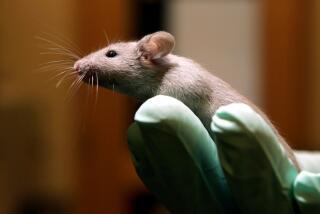Mice, Men Join Forces in Cancer Fight
- Share via
TOKYO — Scientists are melding the cells of mice and men in their search for ways to combat cancer.
Newly developed cells that are basically human but have a genetic factor extracted from mice can deactivate the mechanisms in cancer cells that make them resistant to chemotherapy, Takashi Tsuruo, professor of applied microbiology at the University of Tokyo, reported at a conference in Tokyo.
Cancer cells, like viruses, tend to develop a resistance to drugs used to kill them. Resistant cancer cells also become immune to alternative drugs, making effective treatment more difficult.
Research presented at a conference in May organized by the Japan Foundation for Cancer Research focused on progress in overcoming this resistance. Eighteen leading cancer researchers from Japan, the United States, Canada, the Netherlands and Italy attended.
Genetic therapy and other biochemical techniques can be used to disarm cancer cells’ defenses while strengthening a patient’s immune system, said Tsuruo, who also is chief researcher at the Cancer Chemotherapy Center at the Japanese Foundation for Cancer Research.
One new genetic technique involves injecting drug-resistant human cancer cells into a mouse.
In a reaction like that for a vaccination, the mouse then develops antibodies to fight the illness. Antibodies are proteins formed by the body’s immune system to counteract foreign substances such as bacteria.
From new mouse antibodies, Tsuruo isolated and produced monoclonal antibodies--genetically identical molecules that can be targeted at cancer cells and used to destroy them.
The antibodies, he said, bind to the outside of cancer cells and prevent them from ejecting chemotherapy drugs before the cancer is destroyed.
Conference participants gave a standing ovation to Tsuruo for sharing the monoclonal antibodies he developed with researchers in Europe and the United States, said Dr. Gregory Curt, clinical director of the U.S. National Cancer Institute’s cancer-treatment division.
Also at the conference, Dr. Michael Gottesman, chief of the cell biology laboratory at the U.S. National Cancer Institute, reported that cancer cells’ main line of defense against chemotherapy, called pump proteins because they expel the drugs from the cancer cells, can be used to make other human cells stronger.
Gottesman isolated and transferred pump proteins from cancer cells into bone marrow cells of mice, thus arming the mice’s white blood cells with the protective pump protein. Those white blood cells, which are normally destroyed by powerful chemotherapy, remained unharmed, he said.
“This is designer genes at their best,” Curt said. “Gottesman’s research makes it possible to do this with men as well as with mice, making people immune to the effects of cancer drugs.”
“Gene therapy is the key to the next step in medical treatment worldwide,” he said.
Dr. Karen Antman of Harvard University and the Dana-Farber Cancer Institute presented results of clinical studies indicating that very high doses of chemotherapy coupled with bone-marrow transplants can increase chances for survival in breast cancer patients whose cancer has spread to other parts of the body.
The transplants, using a reserve of the patients’ own marrow, are used to replace bone marrow destroyed by the massive chemotherapy doses, she said. Since bone marrow is the source of white blood cells, a key factor in the body’s immune system, quick replacement of the destroyed cells is necessary to prevent infection.
A study from 13 cancer centers in the United States involving 258 women with metastic breast cancer showed that 58% responded successfully to the treatment, with 32% showing no signs of cancer for almost four years, Antman said.
Chemotherapy in such cases usually yields only a 10% to 30% successful response rate, she said.
Bone marrow transplants are often used to treat cancers of the blood, such as leukemia or myeloma, but have never been used in treatments for tumors like breast cancer, said Dr. Shigeru Tsukagoshi, associate director of the Cancer Chemotherapy Center in Tokyo.





